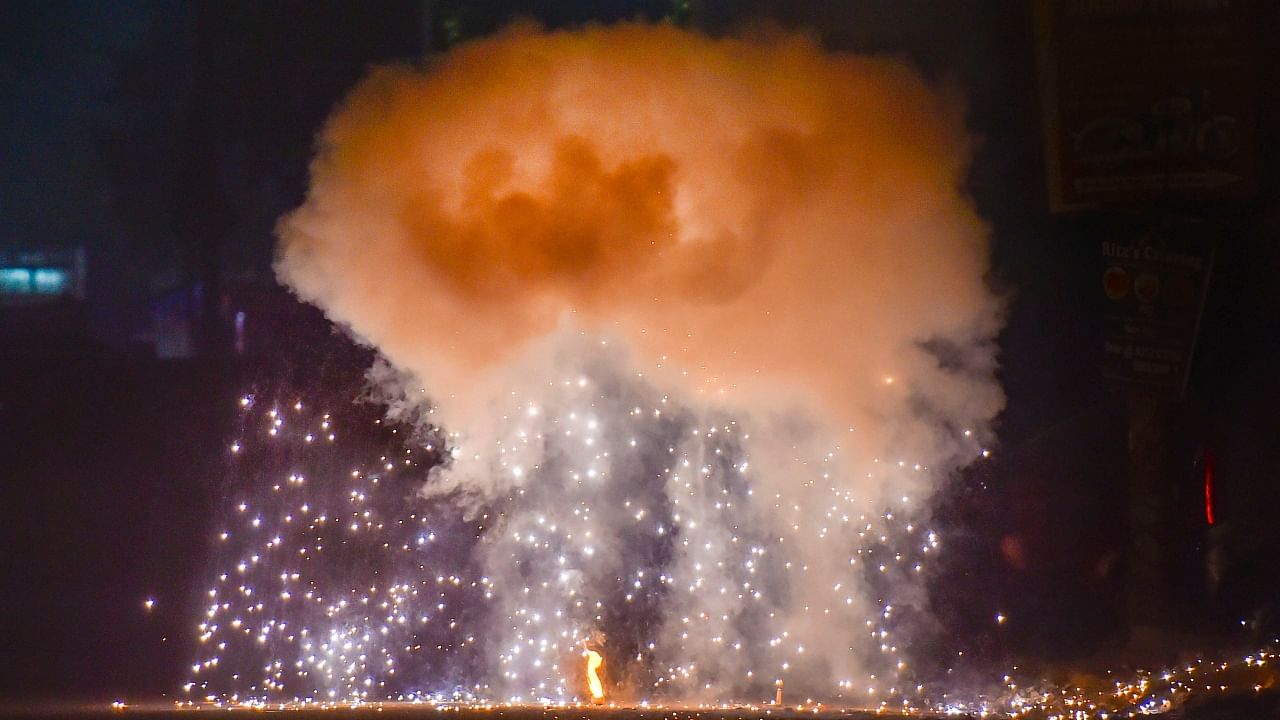
Representative image showing bursting of firecrackers.
Credit: PTI Photo
In a positive development towards sustainable development, the Supreme Court on November 7 banned firecrackers across India, especially those made with barium and banned chemicals. This was a major effort by a proactive judiciary to reduce air pollution and protect the environment.
The ban on toxic firecrackers and the waiver for green firecrackers have been in effect for a few years now. In 2018, the Supreme Court banned the production and sale of firecrackers, including joined firecrackers and those with harmful chemicals, except green ones with reduced emissions. It also ruled that noise pollution should be within permissible limits. This was followed by its order in 2021, where it turned down an appeal by firecracker makers to allow joined crackers and to add barium salt in its green crackers.
In the last few years, no online sale of firecrackers was allowed; only licenced traders were allowed to sell them. In 2020, the National Green Tribunal banned the use and sale of firecrackers in the national capital and allowed only green crackers in cities and towns that had poor or moderate air quality.
This year, some state governments even banned all firecrackers wherever the air quality was already poor, like in the national capital, while others allowed the bursting of green firecrackers during allotted time slots. Karnataka, for instance, allowed the bursting of them between 8 pm and 10 pm. Karnataka’s order came even before the SC’s new ruling, following a tragic fire tragedy in Attibele in a firecrackers warehouse, where 17 lives were lost. The decision was also spurred by vigilant citizens’ groups who demanded that regulations be put in place for safety, optimum air quality, and reduction of noise pollution. The government went a step ahead and banned firecrackers during political functions, rallies, festivals, and weddings too.
The banned colouring agent barium is known to cause skin allergies, breathing difficulties, respiratory tract infections, and even cancer. Green crackers, on the other hand, are known to have components that are considered less dangerous and less harmful to the atmosphere and produce less noise.
While these are positive developments from the side of the law, implementation is key. It is reassuring to see many state governments cracking down on violators. The vigilant Delhi Police has even made many seizures and has been conducting regular checks. Even a three-year jail term is in place if anyone is caught bursting crackers.
The Karnataka Pollution Control Board constituted a special task force to enforce the sale of only green crackers. A police helpline, 112, is also in place.
But the law can only do so much. Authorities can ensure, up to a point, that the law is followed. They can’t be policing every street; it is here that vigilant citizens must step in.
According to media reports, violators continue to have scant regard for the health of themselves and their fellow citizens. In Delhi, there is black marketing of firecrackers, and smoke plumes have continued to rise in a city already facing serious air pollution as people continue to burst crackers in defiance of the ban. This is when the AQI not only indicated poor to very poor conditions but also showed a concentration of poisonous particulate matter in the air, 20 times higher than the permissible limits of the World Health Organisation (WHO).
According to the WHO, 99% of the world’s population lives in places where air pollution levels exceed WHO guideline limits. “Particulate matter, especially PM2.5, can penetrate deep into the lungs and enter the bloodstream, causing cardiovascular, cerebrovascular (stroke), and respiratory impacts,” says the WHO.
Reckless citizens who continue to burst firecrackers in violation of the rules are not only a risk to themselves but also to their families and their neighbours. Rising air pollution is harmful to all of us as a community.
It’s up to us as vigilant citizens to ensure that everyone works in tandem, to keep the air quality good, and to keep air and noise pollution under control so that the air we breathe is safe for everyone. And this vigilance does not stop with just ensuring a safe Diwali this year; we should be able to say no to firecrackers, whatever the occasion—whether it be a procession, a political rally, a celebration, or a wedding.
(The writer is a journalist and author)